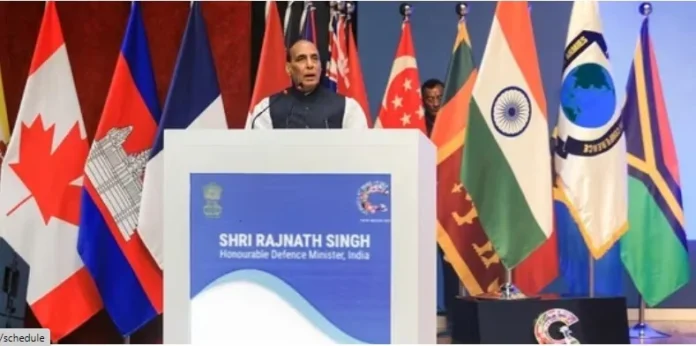New Delhi: Defence Minister Rajnath Singh speaking at the 13th Indo-Pacific Armies Chiefs’ Conference on September 26 pointed out that the Indo-Pacific is not just about the sea but a comprehensive geo-strategic construct, rife with various security challenges, including disputes over borders and piracy. Reiterating India’s stance – which supports a free, open, inclusive, and rules-based Indo-Pacific, he underscored Prime Minister Narendra Modi’s mantra for Indo-Pacific based on mutual respect, dialogue, cooperation, peace and prosperity.
The two-day 13th Indo-Pacific Armies Chiefs’ Conference in New Delhi is being jointly hoisted by the armies of India and the United States. This year’s conference’s theme is “Together for Peace: Sustaining Peace and Stability in the Indo-Pacific Region. The current gathering is notably the largest conference for land forces in the region. The objective of these meetings is to promote peace and stability in the Indo-Pacific region through mutual understanding, dialogue, and friendship.
The minister highlighted instances where the ‘circles of concern’ of different nations overlap, like international maritime trade routes passing through high seas. This could lead to conflicts unless nations mutually establish rules of engagement. It underscores the significance of strategic thinking and prioritisation. Stressing that global issues involve multiple stakeholders, and no single country can tackle them in isolation, Defence Minister Singh emphasised the need for engagement with the broader international community through diplomacy, international organisations, and treaties to address common concerns within overlapping ‘circles of concern’. He cited the United Nations Convention on the Law of the Sea (UNCLOS), 1982, as a successful example of such an international agreement, establishing the legal framework for maritime activities and addressing issues arising from overlapping ‘circles of concern’ among nations.
Additionally, he suggested that states should expand their ‘circle of influence’ to promote national interests globally, which may involve building partnerships, participating in regional organisations, and employing diplomatic, economic, or military tools strategically. He described the conference as an opportunity for all to expand their ‘circles of influence’ while harmonising overlaps in their ‘circles of concern.’
The defence minister acknowledged the Indo-Pacific Armies Chiefs’ Conference, Indo-Pacific Armies Management Seminar (IPAMS), and Senior Enlisted Leaders Forum (SELF) as significant brainstorming events for land forces in the region, fostering shared perspectives and collaborative security. He reiterated India’s commitment to a free, open, inclusive, and rules-based Indo-Pacific Region, guided by principles such as ‘Neighbourhood First’ and the ‘Act East Policy.’ He also highlighted India’s efforts to build strong military partnerships with friendly countries, not only to safeguard national interests but also to address global challenges, particularly climate change. He noted that the Indian Armed Forces play a crucial role in disaster response and humanitarian assistance during extreme weather events.
Considering the increasing challenges posed by climate change in the Indo-Pacific, the minister proposed that the conference focus on enhancing interoperability during humanitarian assistance and disaster relief (HADR) operations. He stated the importance of understanding the perspectives of partner nations and sharing expertise and resources to address climate change-related concerns, particularly for small island nations in the region, which are most affected by climate change.
Acknowledging that reaching a consensus in a large group can be challenging but not impossible, he referred to the recent G-20 summit, where countries adopted the New Delhi Leaders’ Declaration with consensus on developmental and geopolitical issues, marking it as historic and groundbreaking.




